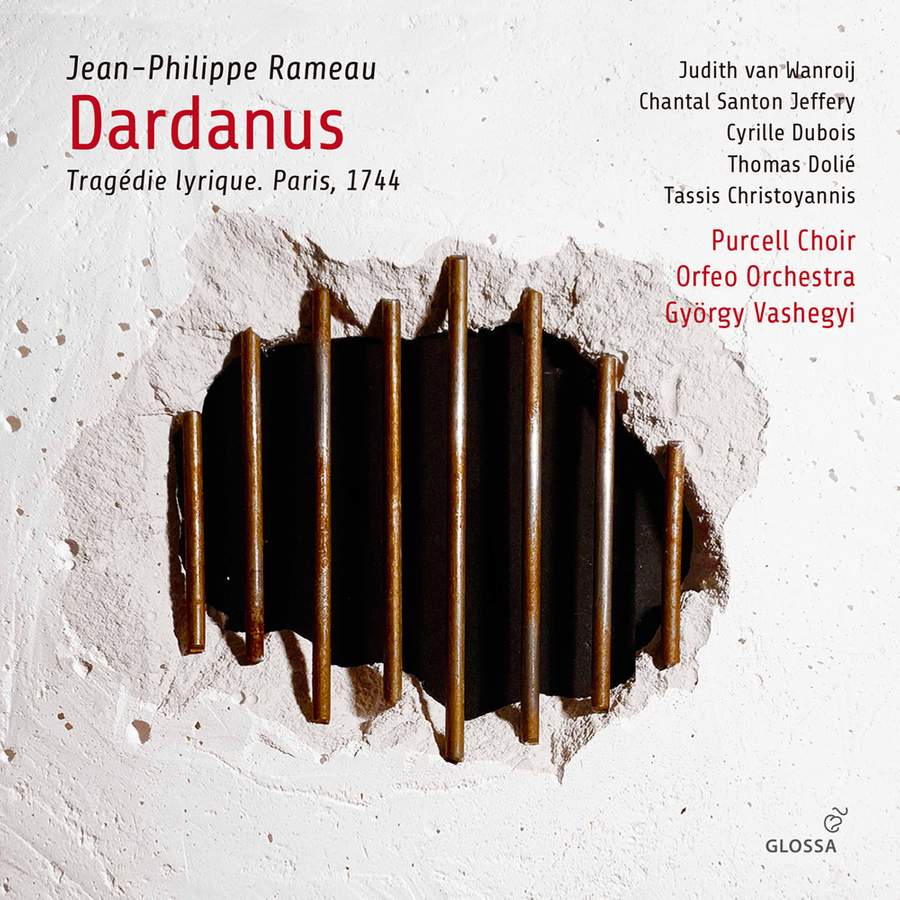RAMEAU Dardanus - Tragedie Lyrique (Vashegyi)
View record and artist detailsRecord and Artist Details
Genre:
Opera
Label: Glossa
Magazine Review Date: 09/2021
Media Format: CD or Download
Media Runtime: 169
Mastering:
DDD
Catalogue Number: GCD924010

Tracks:
| Composition | Artist Credit |
|---|---|
| Dardanus |
Jean-Philippe Rameau, Composer
Chantal Santon-Jeffery, Venus, Soprano Clément Debieuvre, Arcas, Tenor Cyrille Dubois, Dardanus, Tenor György Vashegyi, Conductor Judith Van Wanroij, Iphise, Soprano Orfeo Orchestra Purcell Choir Tassis Christoyannis, Antenor, Baritone Thomas Dolié, Teucer; Magician, Baritone |
Author: David Vickers
Critics scorned the first production of Dardanus in 1739 as dramatically incoherent and reliant on absurd supernatural interventions. This probably accounts for why the libretto and music were rewritten radically for the opera’s revival in April 1744 (and further tweaked a month later). In a nutshell, Acts 3, 4 and 5 were all entirely new, most supernatural scenes were jettisoned and the revised plot concentrated much more on the conflicts and emotions of the five main characters: the Phrygian princess Iphise, her heroic lover Dardanus, his murderous rival Anténor, Iphise’s unsympathetic father Teucer (Anténor’s co-conspirator) and the magician Isménor (Dardanus’s ally).
Most modern recordings and productions conflate the 1739 and 1744 versions together to varying extents. Pygmalion recorded the 1744 version and also, with a dissimilar cast, filmed an enthralling production at the Grand Théâtre de Bordeaux of the 1739 version – although Raphaël Pichon slipped in the imprisoned title-hero’s extraordinary 1744 lament ‘Lieux funestes’ at the start of Act 4; Marc Minkowski’s recording of mostly the 1739 version did the same.
Denis Herlin’s forthcoming Rameau Opera Omnia edition of the 1744 versions is road-tested by the prolific team of György Vashegyi and his excellent Budapest forces. The Ouverture, numerous dances and aria accompaniments are played by the Orfeo Orchestra with an admirable balance of vitality and finesse. The Purcell Choir sing with impeccable security of intonation, robustness and vivid colours. Chantal Santon Jeffery makes the long prologue for Venus seem earnest and emotional (no mean feat). In Act 1, the anguished Iphise’s soliloquy is performed magnificently by Judith van Wanroij, Teucer and Anténor’s obsessive thirst for war is sung with gutsy directness by Thomas Dolié and Tassis Christoyannis, and dances for warriors and a Phrygian woman’s call to arms (sung marvellously by Santon Jeffery) are performed vividly.
In Act 2, Isménor’s animated soothsaying is sung powerfully by Dolié (vivid rushing strings are accompanied by crashing thunderous sound effects), and Cyrille Dubois is an ardent and impassioned Dardanus, yet also limpid and sweet in his high register. Dances for Magicians and Isménor’s incantation to halt the sun are done with theatrical verve, and the rendezvous between Dardanus and Iphise is suitably tender and tormented. Act 3 concentrates on the misery of Anténor at discovering that the captured Dardanus is his rival for Iphise, the haughty pride of Teucer, the gloating Phrygians (several potent choruses) and a celebratory divertissement of assorted graceful dances and elegant airs; Santon Jeffery’s sublime ‘De myrtes couronnez vos têtes’, featuring refined airy violins in its bookending sections and sweet solo flute in its middle, is alone worth the price of admission.
‘Lieux funestes’ is sung with dynamic flexibility and extrovert pathos by Dubois, and its string dissonances, surprising enharmonic shifts and emotive bassoons at the extremity of their range are all played hauntingly – and the contrasting texture of flute-laden delicacy for Isménor’s descent in a ‘resplendent’ chariot is beautifully judged. Their duet with a chorus of airy spirits (‘Viens écouter nos voeux’) is seductively intimate, as is the ensuing divertissement (the two gavottes and rondeau in Act 4 scene 2 are charmingly subtle). The mortally wounded Anténor is sung with desperation (and, it must be said, remarkable heartiness) by Christoyannis. In the final act, the tense confrontation in recitative between the lovers and an implacable Teucer wrings every drop of dramatic tension from Rameau’s harmonic twisting. The concluding celebrations feature Venus (Santon Jeffery’s brilliant agility in ‘Plaisirs, chantez ce jour heureux’), her Cupids and Pleasures, Dardanus’s splendidly virtuoso ‘Triomphe, Amour’ (Dubois dispatching feats of vocal daring with aplomb), a pastoral musette and spiky contredanse, and a suave final chaconne. Vashegyi’s performance captures fizzing inventiveness and sophisticated beauty.
Discover the world's largest classical music catalogue with Presto Music.

Gramophone Digital Club
- Digital Edition
- Digital Archive
- Reviews Database
- Full website access
From £8.75 / month
Subscribe
Gramophone Full Club
- Print Edition
- Digital Edition
- Digital Archive
- Reviews Database
- Full website access
From £11.00 / month
Subscribe
If you are a library, university or other organisation that would be interested in an institutional subscription to Gramophone please click here for further information.




